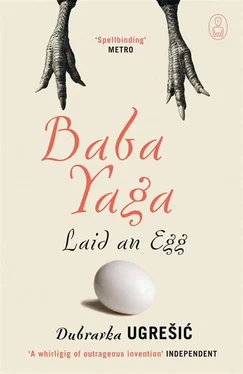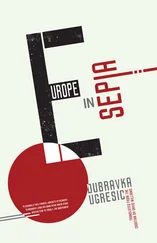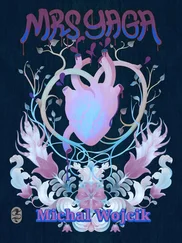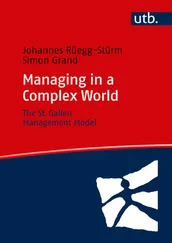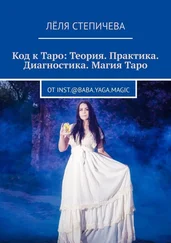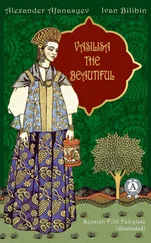Along with these broad uses and abuses of her name, I suppose the average non-Slavic reader does not know much about Baba Yaga. Even for most Slavic readers, she is just a hideous old hag who steals little children. Which brings me precisely to the problem that we share. You modestly admit that you don’t have a clue, and are asking me to explicate the correspondences between your author’s text and the myth of Baba Yaga. In these circumstances you will surely agree that the task you set me is by no means an easy one.
To make my reply as clear and simple as possible, I have compiled a ‘Baba Yaga For Beginners’ – a short glossary of themes, motifs and mythemes linked to Slavic mythology, and therefore also to ‘babayagology’. At this point I should remind you of the notorious fact that Slavic mythology is only conditionally ‘Slavic’. Myths, legends and oral traditions are like viruses. Similar ‘stories’ exist everywhere – in Slavic forests, on African deserts, the foothills of the Himalayas, in Eskimo igloos – and they seep through to our own time and our own mass culture, to TV soaps, sci-fi series, Internet forums and videogames, to Lara Croft, Buffy the Vampire Slayer, and Harry Potter.
Perhaps there is no need to mention that my ‘Baba Yaga for Beginners’ is more or less a compilatory work, for compilation is what we scholars do. The following works were invaluable in preparing my glossary: the Encyclopaedic Dictionary of Slavic Mythology (Slavjanskaja mifologija, Enciklopedicheskij slovar), the Russian two-volume encyclopaedia of world myths (Mify narodov mira), Vladimir Propp’s well-known study The Historical Roots of the Wondertale (Istoricheskie korni volshebnoj skazki), various scholarly studies and reviews (e.g. the excellent Codes of Slavic Culture / Kodovi slavenskih kultura), the most recent and comprehensive study of Baba Yaga – Baba Yaga: the Ambiguous Mother and Witch of the Russian Folktale, by Andreas Johns, and the ever-inspiring books of Marina Warner. I won’t burden you with scholarly references, but I can supply a more extensive bibliography should you need it.
Here, then, is how things stand. First: your author is a writer, and any interpretation in literature is ‘legitimate’. There are no better and worse literary interpretations, there are only good and bad books. Secondly: myths are memes, ‘units of cultural transmission’ or ‘units of imitation’, as defined by evolutionary biologist Richard Dawkins. Myths take themselves to pieces, add bits on, mutate, get transformed, adapt and readapt. Myths travel; in travelling, they retell and ‘translate’ themselves. They never reach their destination, they are locked forever in a transitional–translational state. There is usually no single, clear-cut mythic story: there are only numerous variants. It is like this with the story of Baba Yaga. Thirdly: the lack of explicit references to Baba Yaga in your author’s text stems in part from the muddle around the figure of Baba Yaga herself, around her ambiguous character and authority, and partly from popular superstition. For the Slavs, as for many other peoples, the utterance of names is swathed in taboos. As such, the source of your author’s ‘discreet’ handling of Baba Yaga’s name may lie in folklore taboos related to witches and witchcraft.
The Montenegrins, for example, believe that punishment awaits anyone who looks for a witch. They spread the legend of how Jesus when he fled from persecution found shelter with an old witch, whom he blessed with these words: ‘Whoever would seek you out is doomed to fail.’ It follows that witches cannot be identified because Jesus blessed them when his persecutors tried to capture him in Judaea, and he hid with a witch, and how she did not betray him, and he blessed her so that her activities would remain secret from everybody. (This, according to Tihomir R. Ðorđević in his Witches and Fairies in our Popular Tradition and Belief / Veštica i vila u našem narodnom predanju i verovanju.)
In short, Baba Yaga plays a supporting role, but her interventions in a fairytale are crucial, and it is difficult to say anything about her without mentioning her part in the tale and her relationship to the other characters. Baba Yaga’s roles in fairytales are changeable: sometimes she helps the principal hero or heroine to reach their goal, and at other times she puts obstacles in their way. Overall, I shall do my best to steer you towards the basic ‘facts’ about the mythical figure of Baba Yaga: who she is, where she comes from, where she lives, what she looks like, what she does and so forth. Then we will go over some of the details that may seem unnecessary to you – too comprehensive, and in fact boring. I assure you, however, that every detail has its place in our Baba Yaga puzzle. As we go along, I shall try to draw your attention to the significant links between Baba Yaga and your author’s fictional diptych. The purpose of my commentary will not be interpretative or evaluative, and it will emerge within the separate entries as ‘Remarks’. These ‘remarks’ of mine should be taken as personal interventions which put you under no kind of obligation whatever. For that matter, nothing here puts you under any obligation.
I would wish you to understand the following text as one path through the forest of meanings, in other words a path through a fairytale turned inside out. I shall try to make the path as easy as possible (because it is my job to roam around the forest and peer under every shrub, while it is yours to pass through it). All I ask is that you should be a little patient. Why? Because only patient and steadfast heroes – those who are ready to cross seven mountains and seven seas and wear out three pairs of iron shoes – can expect a reward at the end of the tale. Whether this is what’s waiting for you, I cannot say; that is for you to find out.
Yours very cordially,
Dr Aba Bagay
Baba [12] I should warn you at the outset about the difficulties of transliterating Russian and other Slavic languages into English. There is no consensus on the best mode of transliteration, and the scope for confusion is broadest in texts – such as this – which cite from languages that are written in the Cyrillic alphabet (Russian, Bulgarian, etc.), as well as from those written in the Roman or Latin script (Croatian, Czech, Polish, etc.). As this is a private letter, meant ‘for your eyes only’, I have not tried to take a consistent approach. Russian and Belorusian names and words have for the most part been transliterated. The other Slavic languages are easier to pronounce than you suppose, if you follow these simple rules: š = sh (Mokoš = Mokosh); č., ć = ch (domaći = domachi); ž = zh (život = zhivot); j = y (Jaga = Yaga), đ = dj (prođ-e = prodje), etc.
comes from the Indo-European, whence it spread into many languages. In Slavic languages, the principal meaning of baba is an old woman, grandmother, lady. In colloquial Russian, a baba can be any woman (e.g. horoshaya baba, a good-looking woman), likewise in other Slavic languages. Baba can be a married woman (e.g. moja baba, my wife). Baba can also be a female with bad traits: a fishwife, a gossip, a quarrelsome nag, a shrew. Baba is also a colloquial expression for a cowardly, fearful man. Babica means a midwife, whence the word babinje, which means the postnatal period. Slavs also use the word baba to refer to female mythic characters, particular days, atmospheric effects, astronomical events, illnesses and so on.
Female demonsare often called babas. Mother Wednesday (baba Sereda) watches over the weavers at their looms and stops women from using them on Wednesdays (or it might be any other day). White Lady ( Belaja baba ) is a watery demon, while Bannaja baba (banniha, bajnica, baennaja matushka, obderiha) is a spirit that lives in the traditional Russian steam bath ( banya ). In Ukraine, the Wheaten Lady ( Žitna baba ) is the spirit of the fields; and the Wild Lady ( Dika baba ) is the female demon that leads young men astray. Witches, fortune-tellers and healers are all called – baba.
Читать дальше
